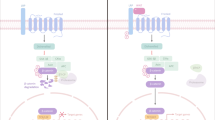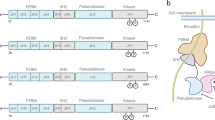Abstract
The RAS–ERK pathway is known to play a pivotal role in differentiation, proliferation and tumour progression. Here, we show that Erk downregulates Forkhead box O 3a (FOXO3a) by directly interacting with and phosphorylating FOXO3a at Ser 294, Ser 344 and Ser 425, which consequently promotes cell proliferation and tumorigenesis. The ERK-phosphorylated FOXO3a degrades via an MDM2-mediated ubiquitin-proteasome pathway. However, the non-phosphorylated FOXO3a mutant is resistant to the interaction and degradation by murine double minute 2 (MDM2), thereby resulting in a strong inhibition of cell proliferation and tumorigenicity. Taken together, our study elucidates a novel pathway in cell growth and tumorigenesis through negative regulation of FOXO3a by RAS–ERK and MDM2.
This is a preview of subscription content, access via your institution
Access options
Subscribe to this journal
Receive 12 print issues and online access
$209.00 per year
only $17.42 per issue
Buy this article
- Purchase on Springer Link
- Instant access to full article PDF
Prices may be subject to local taxes which are calculated during checkout






Similar content being viewed by others
References
Hanahan, D. & Weinberg, R. A. The hallmarks of cancer. Cell 100, 57–70 (2000).
Vogelstein, B. & Kinzler, K. W. Cancer genes and the pathways they control. Nature Med. 10, 789–799 (2004).
Yoon, S. & Seger, R. The extracellular signal-regulated kinase: multiple substrates regulate diverse cellular functions. Growth Factors 24, 21–44 (2006).
Kolch, W. Coordinating ERK/MAPK signalling through scaffolds and inhibitors. Nature Rev. Mol. Cell Biol. 6, 827–837 (2005).
Thompson, N. & Lyons, J. Recent progress in targeting the Raf/MEK/ERK pathway with inhibitors in cancer drug discovery. Curr. Opin. Pharmacol. 5, 350–356 (2005).
Scholl, F. A., Dumesic, P. A. & Khavari, P. A. Effects of active MEK1 expression in vivo. Cancer Lett. 230, 1–5 (2005).
Weinberg, R. A. Fas oncogenes and the molecular mechanisms of carcinogenesis. Blood 64, 1143–1145 (1984).
Giehl, K. Oncogenic Ras in tumour progression and metastasis. Biol. Chem. 386, 193–205 (2005).
Asada, S. et al. Mitogen-activated protein kinases, Erk and p38, phosphorylate and regulate Foxo1. Cell Signal. 19, 519–527 (2007).
Greer, E. L. & Brunet, A. FOXO transcription factors at the interface between longevity and tumor suppression. Oncogene 24, 7410–7425 (2005).
Finnberg, N. & El-Deiry, W. S. Activating FOXO3a, NF-kappaB and p53 by targeting IKKs: an effective multi-faceted targeting of the tumor-cell phenotype? Cancer Biol. Ther. 3, 614–616 (2004).
Burgering, B. M. & Kops, G. J. Cell cycle and death control: long live Forkheads. Trends Biochem. Sci. 27, 352–360 (2002).
Tran, H., Brunet, A., Griffith, E. C. & Greenberg, M. E. The many forks in FOXO's road. Sci STKE RE5 (2003).
Dijkers, P. F. et al. Forkhead transcription factor FKHR-L1 modulates cytokine-dependent transcriptional regulation of p27(KIP1). Mol. Cell Biol. 20, 9138–9148 (2000).
Schmidt, M. et al. Cell cycle inhibition by FoxO forkhead transcription factors involves downregulation of cyclin D. Mol. Cell Biol. 22, 7842–7852 (2002).
Yang, J. Y., Xia, W. & Hu, M. C. Ionizing radiation activates expression of FOXO3a, Fas ligand, and Bim, and induces cell apoptosis. Int. J. Oncol. 29, 643–648 (2006).
Hu, M. C. et al. IkappaB kinase promotes tumorigenesis through inhibition of forkhead FOXO3a. Cell 117, 225–237 (2004).
Hu, M. C. & Hung, M. C. Role of IkappaB kinase in tumorigenesis. Future Oncol. 1, 67–78 (2005).
Potente, M. et al. Involvement of Foxo transcription factors in angiogenesis and postnatal neovascularization. J. Clin. Invest. 115, 2382–2392 (2005).
Paik, J. H. et al. FoxOs are lineage-restricted redundant tumor suppressors and regulate endothelial cell homeostasis. Cell 128, 309–323 (2007).
Plas, D. R. & Thompson, C. B. Akt activation promotes degradation of tuberin and FOXO3a via the proteasome. J. Biol. Chem. 278, 12361–12366 (2003).
Bond, G. L., Hu, W. & Levine, A. J. MDM2 is a central node in the p53 pathway: 12 years and counting. Curr. Cancer Drug Targets 5, 3–8 (2005).
Zhou, B. P. et al. HER-2/neu induces p53 ubiquitination via Akt-mediated MDM2 phosphorylation. Nature Cell Biol. 3, 973–982 (2001).
Uchida, C. et al. Enhanced Mdm2 activity inhibits pRB function via ubiquitin-dependent degradation. EMBO J. 24, 160–169 (2005).
Yang, J. Y. et al. MDM2 promotes cell motility and invasiveness by regulating E-cadherin degradation. Mol. Cell Biol. 26, 7269–7282 (2006).
Ries, S. et al. Opposing effects of Ras on p53: transcriptional activation of mdm2 and induction of p19ARF. Cell 103, 321–330 (2000).
Phelps, M., Phillips, A., Darley, M. & Blaydes, J. P. MEK–ERK signaling controls Hdm2 oncoprotein expression by regulating hdm2 mRNA export to the cytoplasm. J. Biol. Chem. 280, 16651–16658 (2005).
Shaw, R. J. & Cantley, L. C. Ras, PI(3)K and mTOR signalling controls tumour cell growth. Nature 441, 424–430 (2006).
Ding, Q. et al. Erk associates with and primes GSK-3β for its inactivation resulting in upregulation of β-catenin. Mol. Cell 19, 159–170 (2005).
Brunet, A. et al. Akt promotes cell survival by phosphorylating and inhibiting a Forkhead transcription factor. Cell 96, 857–868 (1999).
Honda, R. & Yasuda, H. Activity of MDM2, a ubiquitin ligase, toward p53 or itself is dependent on the RING finger domain of the ligase. Oncogene 19, 1473–1476 (2000).
Honda, R. & Yasuda, H. Association of p19(ARF) with Mdm2 inhibits ubiquitin ligase activity of Mdm2 for tumor suppressor p53. EMBO J. 18, 22–7 (1999).
Honda, R., Tanaka, H. & Yasuda, H. Oncoprotein MDM2 is a ubiquitin ligase E3 for tumor suppressor p53. FEBS Lett. 420, 25–27 (1997).
Medema, R. H., Kops, G. J., Bos, J. L. & Burgering, B. M. AFX-like Forkhead transcription factors mediate cell-cycle regulation by Ras and PKB through p27kip1. Nature 404, 782–787 (2000).
Lin, S. Y. et al. β-catenin, a novel prognostic marker for breast cancer: its roles in cyclin D1 expression and cancer progression. Proc. Natl Acad. Sci. USA 97, 4262–4266 (2000).
Tetsu, O. & McCormick, F. β-catenin regulates expression of cyclin D1 in colon carcinoma cells. Nature 398, 422–426 (1999).
Storz, P., Doppler, H. & Toker, A. Protein kinase D mediates mitochondrion-to-nucleus signaling and detoxification from mitochondrial reactive oxygen species. Mol. Cell Biol. 25, 8520–8530 (2005).
Terry, D. E., Umstot, E. & Desiderio, D. M. Optimized sample-processing time and peptide recovery for the mass spectrometric analysis of protein digests. J. Am. Soc. Mass Spectrom. 15, 784–794 (2004).
Lee, D. F. et al. IKKβ suppression of TSC1 links inflammation and tumor angiogenesis via the mTOR pathway. Cell 130, 440–455 (2007).
Hirosawa, M., Hoshida, M., Ishikawa, M. & Toya, T. MASCOT: multiple alignment system for protein sequences based on three-way dynamic programming. Comput. Appl. Biosci. 9, 161–167 (1993).
Chang, J. Y. et al. The tumor suppression activity of E1A in HER-2/neu-overexpressing breast cancer. Oncogene 14, 561–568 (1997).
Acknowledgements
We thank: P. P. Pandolfi, D.-H. Yan, J. Chen, T. Sakai, P. Coffer and A. Toker for providing expression plasmids; G. Lozano for the knockout MEF cells; M. C.-H. Hu for the p-FOXO3a (644) antibodies; Y. Wei, J.-M. Hsu, S. Zhang, J.-F. Lee and C.-T. Chen for technical support; W. Kaelin, M. Van Dyke and D. Sarbasov for critical comments on the manuscript; and J. C. Cheng and the Department of Scientific Publications, M. D. Anderson Cancer Center for editing the manuscript. This work was supported by National Institutes of Health (NIH) grant P01 CA 099031, MDACC SPORE in Breast Cancer CA116199 and The University of Texas M. D. Anderson Cancer Center support grant CA16672, and was partially supported by the National Breast Cancer Foundation, Inc., Patel Memorial Breast Cancer Research Foundation, Breast Cancer Research Foundation grant and Kadoorie Charitable Foundations.
Author information
Authors and Affiliations
Contributions
J.-Y.Y. and M.-C.H. designed the experiments and wrote the manuscript. M.-C.H. supervised the research. J.-Y.Y. and C.S.Z. performed most of the experiments. W.X. performed the immunohistochemistry staining and contributed to the results shown in Tables 1 and 2. X.X. and J.-Y.L. performed the animal experiments. H.Y., Q.D., C.-J.C., W.-C.W., H.-P.K., D.-F.L., L.-Y.L., H.-C.L. and X.C. assisted with experiments for the revision of the manuscript. C.-C.L., F.-J.T. and C.-H.T were responsible for the LC-MC/MS data. H.H. performed the statistical analysis. All authors contributed to discussions of the manuscript.
Corresponding author
Supplementary information
Supplementary Information
Supplementary Figures S1, S2, s3, S4, S5, and S6 (PDF 521 kb)
Rights and permissions
About this article
Cite this article
Yang, JY., Zong, C., Xia, W. et al. ERK promotes tumorigenesis by inhibiting FOXO3a via MDM2-mediated degradation. Nat Cell Biol 10, 138–148 (2008). https://doi.org/10.1038/ncb1676
Received:
Accepted:
Published:
Issue Date:
DOI: https://doi.org/10.1038/ncb1676
This article is cited by
-
The interplay of mitophagy, autophagy, and apoptosis in cisplatin-induced kidney injury: involvement of ERK signaling pathway
Cell Death Discovery (2024)
-
MDM2 provides TOP2 poison resistance by promoting proteolysis of TOP2βcc in a p53-independent manner
Cell Death & Disease (2024)
-
FOXO3a-interacting proteins’ involvement in cancer: a review
Molecular Biology Reports (2024)
-
3-Bromopyruvate overcomes cetuximab resistance in human colorectal cancer cells by inducing autophagy-dependent ferroptosis
Cancer Gene Therapy (2023)
-
Vitamin B6 regulates IL-33 homeostasis to alleviate type 2 inflammation
Cellular & Molecular Immunology (2023)



